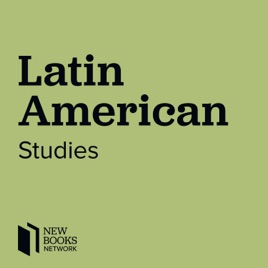
Advertise on podcast: New Books in Latin American Studies
Rating
4.8 from
Country
This podcast has
749 episodes
Language
Publisher
Explicit
No
Date created
2011/03/09
Average duration
62 min.
Release period
4 days
Description
Interview with Scholars of Latin America about their New Books Support our show by becoming a premium member! https://newbooksnetwork.supportingcast.fm/latin-american-studies
Podcast episodes
Check latest episodes from New Books in Latin American Studies podcast
Calla Hummel, "Why Informal Workers Organize: Contentious Politics, Enforcement, and the State" (Oxford UP, 2022)
2024/02/25
Informal workers make up over two billion workers or about 50 percent of the global workforce, and yet scholarly understandings of informal workers’ political and civil society participation remain limited. In Why Informal Workers Organize? Contentious Politics, Enforcement, and the State (Oxford University Press, 2022), Calla Hummel finds that informal workers organize in nearly every country for which data exists, but to varying degrees. Why do informal workers organize in some places more than others? Hummel finds that informal workers organize where state officials encourage them to. Grounded in robust theory that builds on and advances canon literature on collective action problems, Hummel argues that when officials intervene with incentives in the form of cash, licenses, and access to the bureaucracy, they lower the barriers that keep people from organizing on their own. Once informal workers take these incentives and start organizations, officials can bargain over regulation and enforcement with representatives instead of a mass of individuals. These insights are supported by well-triangulated data, including existing and original surveys, over 150 interviews with informal workers in Bolivia and Brazil, and ethnographic evidence collected from multiple cities. The book challenges assumptions about informal workers, offering an original contribution for scholars of informal economies, enforcement, civil society, and state building, as well as public policy practitioners.
Dhouha Djerbi is a PhD candidate in political science at the Geneva Graduate Institute.
Learn more about your ad choices. Visit megaphone.fm/adchoices
Support our show by becoming a premium member! https://newbooksnetwork.supportingcast.fm/latin-american-studies
more
Ariel Mae Lambe, "No Barrier Can Contain It: Cuban Antifascism and the Spanish Civil War" (UNC Press, 2019)
2024/02/25
Ariel Mae Lambe’s new book No Barrier Can Contain It: Cuban Antifascism and the Spanish Civil War (University of North Carolina Press, 2019) is a history of transnational Cuban activists who mobilized in the mid-1930s to fight fascism both in Cuba and beyond. A wide variety of civic and political groups, including Communists, anarchists, Freemasons, and Afro-Cubans, mobilized to support the Spanish Republican cause, which they connected to their efforts at home to fight persisting colonial structures and strongman politics. Lambe emphasizes the human side of antifascist activism through biographical studies of both well-known and overlooked Cuban figures. Her book shows that the 1930s, often dismissed as an apolitical period in Cuban history, were in fact characterized by vibrant efforts to raise funds, send combat troops, and provide other kinds of aid to Spanish Republicans. Lambe argues that important changes on the island in 1940 – the holding of free elections and the promulgation of a progressive constitution – suggest that Cuban antifascist efforts, though unable to turn the tide of the Spanish Civil War, did have an impact on Cuban domestic politics. In the interview, Lambe reflects on how her work is relevant to the Antifa movement of today.
Rachel Grace Newman is Lecturer in the History of the Global South at Smith College. She has a Ph.D. in History from Columbia University, and she writes about elite migration, education, transnationalism, and youth in twentieth-century Mexico. She is also the author of a book on a binational program for Mexican migrant children. She is on Twitter (@rachelgnew).
Learn more about your ad choices. Visit megaphone.fm/adchoices
Support our show by becoming a premium member! https://newbooksnetwork.supportingcast.fm/latin-american-studies
more
Raanan Rein, "Populism and Ethnicity: Peronism and the Jews of Argentina" (McGill-Queen's UP, 2020)
2024/02/23
Juan Perón's decade-long regime, from 1946 to 1955, is often presented as Nazi-fascist and antisemitic - claims that are strongly rooted in Argentina's collective unconscious and popular culture. Challenging this widely held view, Raanan Rein asserts that there was greater Jewish support for Perón than previously believed, and that fewer antisemitic incidents took place in Argentina during Perón's rule than during any other period in the twentieth century.
Recovering the silenced voices of Jewish Argentines who supported Peronism from the beginning, Populism and Ethnicity: Peronism and the Jews of Argentina (McGill-Queen's UP, 2020) is a historical, sociological, and political analysis that describes the many positive changes experienced by the Jewish community as a direct result of Perón's presidencies. Perón and his wife Eva gave numerous speeches denouncing antisemitism, and Perón's Argentina was the first Latin American country to open an embassy in the newly established State of Israel.
Arguing that no president before Perón so unambiguously rejected discrimination against Jews, Rein shows that many Jews secured more important posts in government in the 1940s and 1950s than in previous years, among them members of the Argentine Jewish Organization, which became a section of the ruling Peronist party. Deconstructing the myth of antisemitism during Perón's regime, Populism and Ethnicity looks deep into the heart of international memory for the truth behind Jewish-Argentine relations.
Learn more about your ad choices. Visit megaphone.fm/adchoices
Support our show by becoming a premium member! https://newbooksnetwork.supportingcast.fm/latin-american-studies
more
Magalí Armillas-Tiseyra, "The Dictator Novel: Writers and Politics in the Global South" (Northwestern UP, 2019)
2024/02/18
Where there are dictators, there are novels about dictators. But "dictator novels" do not simply respond to the reality of dictatorship. As this genre has developed and cohered, it has acquired a self-generating force distinct from its historical referents. The dictator novel has become a space in which writers consider the difficulties of national consolidation, explore the role of external and global forces in sustaining dictatorship, and even interrogate the political functions of writing itself. Literary representations of the dictator, therefore, provide ground for a self-conscious and self-critical theorization of the relationship between writing and politics itself.
Magalí Armillas-Tiseyra's book The Dictator Novel: Writers and Politics in the Global South (Northwestern UP, 2019) positions novels about dictators as a vital genre in the literatures of the Global South. Primarily identified with Latin America, the dictator novel also has underacknowledged importance in the postcolonial literatures of francophone and anglophone Africa. Although scholars have noted similarities, this book is the first extensive comparative analysis of these traditions; it includes discussions of authors including Gabriel García Márquez, Ngũgĩ wa Thiong'o, Alejo Carpentier, Augusto Roa Bastos, Domingo Faustino Sarmiento, José Mármol, Esteban Echeverría, Ousmane Sembène, Chinua Achebe, Aminata Sow Fall, Henri Lopès, Sony Labou Tansi, and Ahmadou Kourouma. This juxtaposition illuminates the internal dynamics of the dictator novel as a literary genre. In so doing, Armillas-Tiseyra puts forward a comparative model relevant to scholars working across the Global South.
Learn more about your ad choices. Visit megaphone.fm/adchoices
Support our show by becoming a premium member! https://newbooksnetwork.supportingcast.fm/latin-american-studies
more
Pablo Alonso González, "Cuban Cultural Heritage: A Rebel Past for a Revolutionary Nation" (UP of Florida, 2018)
2024/02/16
Cuban Cultural Heritage: A Rebel Past for a Revolutionary Nation (UP of Florida, 2018) explores the role that cultural heritage and museums played in the construction of a national identity in postcolonial Cuba. Starting with independence from Spain in 1898 and moving through Cuban-American rapprochement in 2014, Pablo Alonso González illustrates how political and ideological shifts have influenced ideas about heritage and how, in turn, heritage has been used by different social actors to reiterate their status, spread new ideologies, and consolidate political regimes. Unveiling the connections between heritage, power, and ideology, Alonso González delves into the intricacies of Cuban history, covering key issues such as Cuba's cultural and political relationships with Spain, the United States, the Soviet Union, and so-called Third World countries; the complexities of Cuba's status as a postcolonial state; and the potential future paths of the Revolution in the years to come. This volume offers a detailed look at the function and place of cultural heritage under socialist states.
Pablo Alonso González is a Senior Researcher at the Spanish National Research Council (IPNA-CSIC). He is the author of several books, including Cultural Parks and National Heritage Areas: Assembling Cultural Heritage, Development and Spatial Planning.
Katie Coldiron is the Outreach Program Manager for the Digital Library of the Caribbean (dLOC) and PhD student in History at Florida International University.
Learn more about your ad choices. Visit megaphone.fm/adchoices
Support our show by becoming a premium member! https://newbooksnetwork.supportingcast.fm/latin-american-studies
more
Diego Javier Luis, "The First Asians in the Americas: A Transpacific History" (Harvard UP, 2024)
2024/02/15
There’s a popular folk hero in Puebla, Mexico—Catarina de San Juan, who Mexicans hailed as a devoted religious figure after her death in 1688. She’s credited with creating the China Poblana dress, a connection of dubious historical veracity made several centuries after her death.
But Catarina is one of Mexico’s most famous “chinos”—despite the fact that she was likely from India, not China. In fact, any Asian that disembarked in Mexico, whether from China, Japan, the Philippines, India, or even further away, was called “chino.” It was not a particularly beneficial classification: “Chinos,” under Spanish law, could be enslaved; “Indios,” or indigenous populations, could not.
That’s just one part of Diego Luis’s historical investigation into the first Asians in the Americas in a book titled, appropriately, The First Asians in the Americas: A Transpacific History (Harvard University Press: 2024). Diego Javier Luis is Assistant Professor of History at Tufts University.
Today, Diego and I talk about Asians in the Spanish Empire, both in the Philippines and in Mexico, and some of the interesting ways that these first Asians tried to push back against their oppressors.
You can find more reviews, excerpts, interviews, and essays at The Asian Review of Books, including its review of The First Asians in the Americas. Follow on Twitter at @BookReviewsAsia.
Nicholas Gordon is an editor for a global magazine, and a reviewer for the Asian Review of Books. He can be found on Twitter at @nickrigordon.
Learn more about your ad choices. Visit megaphone.fm/adchoices
Support our show by becoming a premium member! https://newbooksnetwork.supportingcast.fm/latin-american-studies
more
Marisol LeBrón, "Policing Life and Death: Race, Violence, and Resistance in Puerto Rico" (U California Press, 2019)
2024/02/14
Marisol LeBrón’s new book, Policing Life and Death: Race, Violence, and Resistance in Puerto Rico (University of California Press, 2019), examines the rise of and resistance to punitive governance (tough on crime policing policies) in Puerto Rico from the 1990s to the present. As in the United States, LeBrón shows how increased investment in policing did not respond to a spike in crime. It actually emerged as a strategy to shore up the local political and economic establishment mired in the crisis of the archipelago’s postwar colonial development policy “Operation Bootstrap,” spiking unemployment, lack of U.S. investment, and a growing informal economy which included the drug trade. Puerto Rican elites hoped to reinvent themselves as models for tough on crime policing and gatekeepers for the United States to Latin America. Beginning with the mano dura contra el crimen (iron fist against crime) policy of commonwealth Governor Pedro Rosselló in 1993, police increasingly targeted lower income, predominantly Black public housing complexes (caseríos) as sources of criminality and lawlessness. Using Justice Department reports, social media research, newspapers, and oral interviews to create a “police archive,” LeBrón demonstrates that while police killings, brutality, surveillance, and harassment were hallmarks of mano dura, the policy also reinvented popular understandings of the “who” and “where” of crime that endure to the present. In doing so, she shows how presumptions about race, class, gender, and sexuality linked to certain places (public housing, sex work neighborhoods, schools, and universities) created notions of victims and criminals who “deserved” life or death. The book’s second half explores critiques of and resistance to punitive governance by looking at underground rap, university student activism, social media debates, and non-punitive anti-violence activism. These case studies show the growing resistance to policing as policy instead of social investment, but also the tenacity of the discourses of criminality activists must wrestle with today.
LeBrón is also the author of the forthcoming Aftershocks of Disaster: Puerto Rico Before and After the Storm (Haymarket Books) and the co-creator of the Puerto Rico Syllabus.
Jesse Zarley will be an assistant professor of history at Saint Joseph’s College on Long Island, where in Fall 2019 he will be teaching Latin American, Caribbean, and World History. His research interests include borderlands, ethnohistory, race, and transnationalism during Latin America’s Age of Revolution, particularly in Chile and Argentina. He is the author of a recent article on Mapuche leaders and Chile’s independence wars. You can follow him on Twitter.
Learn more about your ad choices. Visit megaphone.fm/adchoices
Support our show by becoming a premium member! https://newbooksnetwork.supportingcast.fm/latin-american-studies
more
Bryce Henson, "Emergent Quilombos: Black Life and Hip-Hop in Brazil" (U Texas Press, 2023)
2024/02/07
Known as Black Rome, Salvador da Bahia, Brazil, is a predominantly Black city. The local art, food, and dance are closely linked to the population's African roots. Yet many Black Brazilian residents are politically and economically disenfranchised. Bryce Henson details a culture of resistance and activism that has emerged in response, expressed through hip-hop and the social relations surrounding it.
Based on years of ethnographic research, Emergent Quilombos: Black Life and Hip-Hop in Brazil (University of Texas Press, 2023) illuminates how Black hip-hop artists and their circles contest structures of anti-Black racism by creating safe havens and alternative social, cultural, and political systems that serve Black people. These artists valorize and empower marginalized Black peoples through song, aesthetics, media, visual art, and community action that emphasize diasporic connections, ancestrality, and Black identifications in opposition to the anti-Black Brazilian nation. In the process, Henson argues, the Salvador hip-hop scene has reinvigorated and reterritorialized a critical legacy of Black politicocultural resistance: the quilombo, maroon communities of Black fugitives who refused slavery as a way of life, gathered away from the spaces of their oppression, protected their communities, and nurtured Black life in all its possibilities.
Bryce Henson is an assistant professor of media, culture, and identity in the Department of Communication and Journalism and associate faculty in the Africana Studies Program at Texas A&M University.
Reighan Gillam is an Associate Professor in the Department of Latin American, Latino, and Caribbean Studies at Dartmouth College. Her research examines the ways in which Afro-Brazilian media producers foment anti-racist visual politics through their image creation. She is the author of Visualizing Black Lives: Ownership and Control in Afro-Brazilian Media (University of Illinois Press).
Learn more about your ad choices. Visit megaphone.fm/adchoices
Support our show by becoming a premium member! https://newbooksnetwork.supportingcast.fm/latin-american-studies
more
Suzanne Oakdale, "Amazonian Cosmopolitans: Navigating a Shamanic Cosmos, Shifting Indigenous Policies, and Other Modern Projects" (U Nebraska Press, 2022)
2024/01/28
In Amazonian Cosmopolitans: Navigating a Shamanic Cosmos, Shifting Indigenous Policies, and Other Modern Projects (U Nebraska Press, 2022), Suzanne Oakdale focuses on the autobiographical accounts of two Brazilian Indigenous leaders, Prepori and Sabino, Kawaiwete men whose lives spanned the twentieth century, when Amazonia increasingly became the context of large-scale state projects. Both give accounts of how they worked in a range of interethnic enterprises from the 1920s to the 1960s in central Brazil. Prepori, a shaman, also gives an account of his relations with spirit beings that populate the Kawaiwete cosmos as he participated in these projects.
Like other Indigenous Amazonians, Kawaiwete value engagement with outsiders, particularly for leaders and shamanic healers. These social engagements encourage a careful watching and learning of others’ habits, customs, and sometimes languages, what could be called a kind of cosmopolitanism or an attitude of openness, leading to an expansion of the boundaries of community. The historical consciousness presented by these narrators centers on how transformations in social relations were experienced in bodily terms—how their bodies changed as new relationships formed. Amazonian Cosmopolitans offers Indigenous perspectives on twentieth-century Brazilian history as well as a way to reimagine lowland peoples as living within vast networks, bridging wide social and cosmological divides.
Suzanne Oakdale is Professor of Anthropology at The University of New Mexico. She specializes in Brazil, with research focused on Amazonian indigenous peoples. She explores the dynamics of ritual practice; history; and the social anthropology of the person and personal experience, particularly how these genres reflect and are used to address large scale social shifts. She is the editor of the Journal of Anthropological Research.
Yadong Li is a PhD student in anthropology at Tulane University. His research interests lie at the intersection of the anthropology of state, the anthropology of time, hope studies, and post-structuralist philosophy. More details about his scholarship and research interests can be found here.
Learn more about your ad choices. Visit megaphone.fm/adchoices
Support our show by becoming a premium member! https://newbooksnetwork.supportingcast.fm/latin-american-studies
more
Rachel Nolan, "Until I Find You: Disappeared Children and Coercive Adoptions in Guatemala" (Harvard UP, 2024)
2024/01/28
The poignant saga of Guatemala's adoption industry: an international marketplace for children, built on a foundation of inequality, war, and Indigenous dispossession. In 2009 Dolores Preat went to a small Maya town in Guatemala to find her birth mother. At the address retrieved from her adoption file, she was told that her supposed mother, one Rosario Colop Chim, never gave up a child for adoption--but in 1986 a girl across the street was abducted. At that house, Preat met a woman who strongly resembled her. Colop Chim, it turned out, was not Preat's mother at all, but a jaladora--a baby broker. Some 40,000 children, many Indigenous, were kidnapped or otherwise coercively parted from families scarred by Guatemala's civil war or made desperate by unrelenting poverty. Amid the US-backed army's genocide against Indigenous Maya, children were wrested from their villages and put up for adoption illegally, mostly in the United States.
During the war's second decade, adoption was privatized, overseen by lawyers who made good money matching children to overseas families. Private adoptions skyrocketed to the point where tiny Guatemala overtook giants like China and Russia as a "sender" state. Drawing on government archives, oral histories, and a rare cache of adoption files opened briefly for war crimes investigations, Rachel Nolan explores the human toll of an international industry that thrives on exploitation. Would-be parents in rich countries have fostered a commercial market for children from poor countries, with Guatemala becoming the most extreme case. Until I Find You: Disappeared Children and Coercive Adoptions in Guatemala (Harvard UP, 2024) reckons with the hard truths of a practice that builds loving families in the Global North out of economic exploitation, endemic violence, and dislocation in the Global South.
Rachel Nolan is Contributing Editor at Harper’s Magazine and has written for the New Yorker, the London Review of Books, the New York Times, the New York Review of Books, and the Salvadoran investigative news outlet El Faro. She is Assistant Professor of International Relations at Boston University.
Katie Coldiron is the Outreach Program Manager for the Digital Library of the Caribbean (dLOC) and PhD student in History at Florida International University.
Learn more about your ad choices. Visit megaphone.fm/adchoices
Support our show by becoming a premium member! https://newbooksnetwork.supportingcast.fm/latin-american-studies
more
Marcia Stephenson, "Llamas beyond the Andes: Untold Histories of Camelids in the Modern World" (U Texas Press, 2023)
2024/01/27
Camelids are vital to the cultures and economies of the Andes. The animals have also been at the heart of ecological and social catastrophe: Europeans overhunted wild vicuña and guanaco and imposed husbandry and breeding practices that decimated llama and alpaca flocks that had been successfully tended by Indigenous peoples for generations. Yet the colonial encounter with these animals was not limited to the New World. Llamas Beyond the Andes: The Untold History of Camelids in the Modern World (University of Texas Press, 2023) by Dr. Marcia Stephenson tells the five-hundred-year history of animals removed from their native habitats and transported overseas.
Initially Europeans prized camelids for the bezoar stones found in their guts: boluses of ingested matter that were thought to have curative powers. Then the animals themselves were shipped abroad as exotica. As Europeans and US Americans came to recognize the economic value of camelids, new questions emerged: What would these novel sources of protein and fiber mean for the sheep industry? And how best to cultivate herds? Andeans had the expertise, but knowledge sharing was rarely easy. Marcia Stephenson explores the myriad scientific, commercial, and cultural interests that have attended camelids globally, making these animals a critical meeting point for diverse groups from the North and South.
This interview was conducted by Dr. Miranda Melcher whose forthcoming book focuses on post-conflict military integration, understanding treaty negotiation and implementation in civil war contexts, with qualitative analysis of the Angolan and Mozambican civil wars.
Learn more about your ad choices. Visit megaphone.fm/adchoices
Support our show by becoming a premium member! https://newbooksnetwork.supportingcast.fm/latin-american-studies
more
Chelsea Schields, "Offshore Attachments: Oil and Intimacy in the Caribbean" (U California Press, 2023)
2024/01/21
Chelsea Schields's book Offshore Attachments: Oil and Intimacy in the Caribbean (U California Press, 2023) reveals how the contested management of sex and race transformed the Caribbean into a crucial site in the global oil economy. By the mid-twentieth century, the Dutch islands of Curaçao and Aruba housed the world's largest oil refineries. To bolster this massive industrial experiment, oil corporations and political authorities offshored intimacy, circumventing laws regulating sex, reproduction, and the family in a bid to maximize profits and turn Caribbean subjects into citizens.
Historian Chelsea Schields demonstrates how Caribbean people both embraced and challenged efforts to alter intimate behavior in service to the energy economy. Moving from Caribbean oil towns to European metropolises and examining such issues as sex work, contraception, kinship, and the constitution of desire, Schields narrates a surprising story of how racialized concern with sex shaped hydrocarbon industries as the age of oil met the end of empire.
Chelsea Schields is Associate Professor of History at the University of California, Irvine.
Katie Coldiron is the Outreach Program Manager for the Digital Library of the Caribbean (dLOC) and PhD student in History at Florida International University.
Learn more about your ad choices. Visit megaphone.fm/adchoices
Support our show by becoming a premium member! https://newbooksnetwork.supportingcast.fm/latin-american-studies
more
Podcast reviews
Read New Books in Latin American Studies podcast reviews
Podcast sponsorship advertising
Start advertising on New Books in Latin American Studies & sponsor relevant audience podcasts
You may also like these society & culture Podcasts

4.8
2231
241
You Are Good
Sarah Marshall + Alex Steed

4.7
12956
296
Terrible, Thanks For Asking
Feelings & Co.

4.5
12451
169
Duolingo Spanish Podcast
Duolingo

4.3
72
49
Travel That Matters
CurtCo Media

4.6
7
35
Walking Through the Bhagavad Gita
Michael Douglas Neely

4.7
1725
748
Modern Wisdom
Chris Williamson

4.7
2505
146
I Will Teach You To Be Rich
Ramit Sethi

4.7
6447
533
Drink Champs
Interval Presents

4.9
1120
118
Sorry We're Stoned with Tish & Brandi Cyrus
Brandi and Tish Cyrus

4.8
14142
196
Philosophize This!
Stephen West



